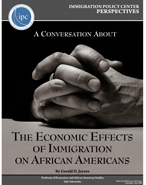 By Gerald D. Jaynes
By Gerald D. Jaynes
Anti-immigrant groups have repeatedly tried to drive a wedge between African Americans and immigrants by capitalizing on the myth that immigrants take American jobs. In a new Perspectives piece for the Immigration Policy Center, Yale Professor Gerald Jaynes dispels the myth that immigrants take “black jobs” and instead suggests we find solutions on how to lift up all low-wage American workers.
Most African Americans are very conflicted about the immigration issue. African Americans, who have long espoused strong beliefs in principles of equality of opportunity, the rights of the downtrodden, and respect for humanity viewed in its broadest terms, are especially cognizant of the hypocrisy embedded within ethnocentric demands for an end to immigration. For the nation, immigration‘s economic benefits exceed its costs, but the costs are disproportionately borne by certain social groups and geographic areas. Rather than divide the public over the issue of depriving the country of the benefits to help the few who pay the highest costs, we need to be engaging in a political debate over the kinds and levels of compensatory policies that should be enacted to help low‐income citizens.
Published On: Tue, Jul 14, 2009 | Download File



